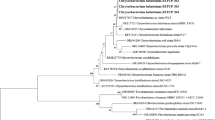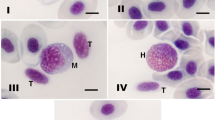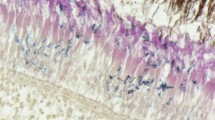Abstract
CLADOCERA are often coloured red by hæmoglobin in their blood1; another red pigment has been found in specimens infected by Spirobacillus cienkowskii which Metchnikoff2 described from Daphnia magna Straus. The bacterium passes through a series of stages within the cladoceran and causes it to assume a bright red colour.
This is a preview of subscription content, access via your institution
Access options
Subscribe to this journal
Receive 51 print issues and online access
$199.00 per year
only $3.90 per issue
Buy this article
- Purchase on Springer Link
- Instant access to full article PDF
Prices may be subject to local taxes which are calculated during checkout
Similar content being viewed by others
References
Fox, H. M., Nature, 164, 59 (1949).
Metchnikoff, E., Bull. Inst. Pasteur., 3, 61 (1889).
Goodwin, T. W., “The Comparative Biochemistry of the Carotenoids”, 120 (London, 1952).
Author information
Authors and Affiliations
Rights and permissions
About this article
Cite this article
GREEN, J. Carotenoid Pigment in Spirobacillus cienkowskii Metchnikoff, a Pathogen of Cladocera. Nature 183, 56–57 (1959). https://doi.org/10.1038/183056a0
Issue Date:
DOI: https://doi.org/10.1038/183056a0
Comments
By submitting a comment you agree to abide by our Terms and Community Guidelines. If you find something abusive or that does not comply with our terms or guidelines please flag it as inappropriate.



